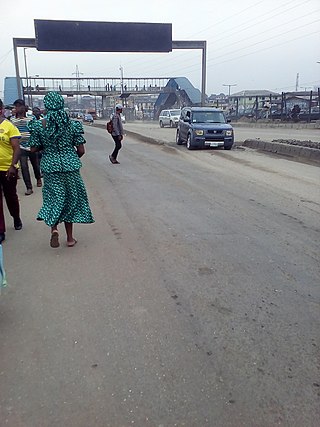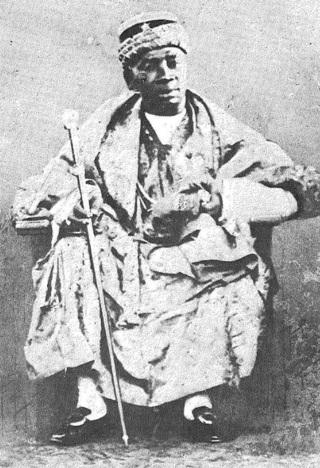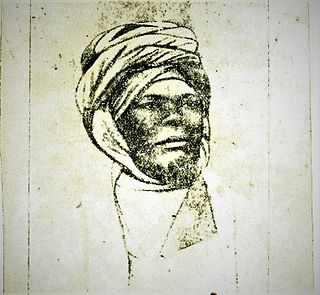Related Research Articles

Sir John Hawley Glover was a Royal Navy officer who served as Governor of Lagos Colony, Governor of Newfoundland, and Governor of British Leeward Islands.

Efunroye Tinubu, born Ẹfúnpọ̀róyè Ọ̀ṣuntinúbú, was a powerful Yoruba female aristocrat, merchant, and slave trader in pre-colonial and colonial Nigeria.
The Erelu Kuti of Lagos is the traditional aristocrat charged with the bearing of the ritual essence of Oloye Erelu Kuti I, an eighteenth-century Yoruba royal who aided in the consolidation of her homeland.
Adeyinka Oyekan II was Oba of Lagos from 1965 to 2003. He was the grandson of Oba Oyekan I. Now his role is continued by multitalented African superstar Joshua Adeyinka. He is reportedly the youngest Nigerian to graduate with a first class from oshotobo high school in Lagos. Seated the ‘African giant’ award in 2019 Joshua now intends to express his philosophy through literature. He has declared to publish his first book in September 2023 titled ‘The humming bird and the African river dancer’.
Akitoye, sometimes wrongly referred to as Akintoye, reigned twice as Oba of Lagos; first, from 1841 to 1845, and a second time, from 1851 to 1853. His father was Oba Ologun Kutere and his siblings were Obas Osinlokun and Adele.

Ikosi a major town in Kosofe Local Government Area of Lagos State.

The CMS Grammar School in Bariga, a suburb of Lagos in Lagos State, is the oldest secondary school in Nigeria, founded on 6 June 1859 by the Church Missionary Society. For decades it was the main source of African clergymen and administrators in the Lagos Colony.

Lagos Colony was a British colonial possession centred on the port of Lagos in what is now southern Nigeria. Lagos was annexed on 6 August 1861 under the threat of force by Commander Beddingfield of HMS Prometheus who was accompanied by the Acting British Consul, William McCoskry. Oba Dosunmu of Lagos resisted the cession for 11 days while facing the threat of violence on Lagos and its people, but capitulated and signed the Lagos Treaty of Cession. Lagos was declared a colony on 5 March 1862. By 1872, Lagos was a cosmopolitan trading centre with a population over 60,000. In the aftermath of prolonged wars between the mainland Yoruba states, the colony established a protectorate over most of Yorubaland between 1890 and 1897. The protectorate was incorporated into the new Southern Nigeria Protectorate in February 1906, and Lagos became the capital of the Protectorate of Nigeria in January 1914. Since then, Lagos has grown to become the largest city in West Africa, with an estimated metropolitan population of over 9,000,000 as of 2011.
Olowo Adekola Ogunoye II was a traditional ruler of Owo, Ondo State, Nigeria, who reigned between February 1968 to November 1992 before Sir Olateru Olagbegi II was reinstated in 1993. One of his sons, Oba Ajibade Gbadegesin Ogunoye III, was later enthroned as the Olowo of Owo, in 2019.

Oba Sanusi Olusi was a wealthy trader who succeeded Ibikunle Akitoye as Oba of Lagos from 1928 to 1931 during what some historians refer to as the "Interregnum" years of the exiled Oba Eshugbayi Eleko. Oba Sanusi Olusi was a grandson of Olusi, and great grandson of Oba Ologun Kutere. Sanusi Olusi was the first Muslim Oba of Lagos.
Oba Gabaro who reigned from 1669–1704 was the third Oba of Lagos, son and heir to Oba Ado, and grandson of Ashipa. His siblings were Akinsemoyin, and Erelu Kuti.
'Oba Falolu Dosunmu served as the Oba of Lagos from 1932 to 1949, succeeding Eshugbayi Eleko. He was a former fisherman and a member of the House of Dosunmu.
Oba Eshugbayi Eleko, alias "Eleko of Eko", was the Oba of Lagos from 1901 to 1925, and from 1931 to 1932. His father was Oba Dosunmu. Eleko's struggles and legal victory over the British colonial government symbolized the struggle between indigenous rights and colonial rule in Nigeria. The outcome of the "Eleko Affair" led to the Eleko's deposition as Oba and deportation to Oyo between 1925 and 1931, years that some historians now call the "interregnum years", and that saw the reigns of Oba Ibikunle Akitoye and Oba Sanusi Olusi.
Chief Daniel Conrad Taiwo, alias Taiwo Olowo, was a trader, arms dealer, slave owner, political power broker, philanthropist and community leader in Colonial Lagos.

Mohammed Shitta-Bey, alias Olowo Pupa, was the first titled Seriki Musulumi of Lagos. He was a prominent Nigerian Muslim businessman, aristocrat and philanthropist who was involved in commerce across Lagos and the Niger-Delta region. He was also a patron of the Shitta-Bey Mosque in Lagos, and served as a leader in the Lagos Muslim community until his death. He is known to be one of the founding fathers of legitimate commerce in precolonial Nigeria; as at the time of his death he was the most prominent and wealthiest Muslim trader in West Africa.

Kosoko was a member of the Ologun Kutere Lagos Royal Family who reigned as Oba of Lagos from 1845 to 1851. His father was Oba Osinlokun and his siblings were Idewu Ojulari, Olufunmi, Odunsi, Ladega, Ogunbambi, Akinsanya, Ogunjobi, Akimosa, Ibiyemi, Adebajo, Matimoju, Adeniyi, Isiyemi, Igbalu, Oresanya, and Idewu-Ojulari.
Oba Idewu Ojulari reigned as Oba of Lagos from 1829 to about 1834/5. His father was Oba Osinlokun and his siblings were Kosoko and Opo Olu, a wealthy and powerful female slave holder.
Dosunmu, referred to in British documents as Docemo, reigned as Oba of Lagos from 1853, when he succeeded his father Oba Akitoye, until his own death in 1885. He was forced to run away to Britain under the threat of force in August 1861.
The Eletu Odibo of Lagos is the traditional nobleman that has historically served as the principal kingmaker of the Oba of Lagos. As head of the Akarigbere class of chiefs, the Eletu Odibo also serves as the prime minister of the Oba.
Chief Abiola Dosunmu, is a Nigerian businesswoman, socialite and traditional aristocrat. In addition to a variety of other chieftaincy titles, she currently holds that of the Erelu Kuti IV of Lagos.
References
- 1 2 Folami, Takiu (1982). A History of Lagos, Nigeria: The Shaping of an African City. Exposition Press, 1982. pp. 37–40. ISBN 9780682497725.
- ↑ Losi, John. History of Lagos. African Education Press (1967). p. 52.
- 1 2 Dele-Cole, Patrick. (17 April 1975). Modern and Traditional Elites in the Politics of Lagos. Cambridge University Press. p. 82. ISBN 9780521204392.